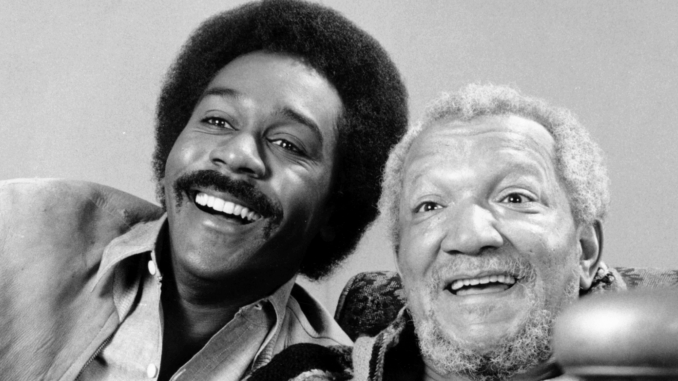
Before sitcoms became polished and sentimental, Sanford and Son introduced America to a father and son who bickered, hustled, and loved each other in the most unfiltered way possible.
Fred Sanford, played by the legendary Redd Foxx, was no idealized TV dad. He was a trash-collecting widower from Watts, a self-proclaimed junk dealer with a sharp tongue and an even sharper talent for fake heart attacks. His son Lamont, portrayed by Demond Wilson, was the straight man — grounded, often frustrated, and dreaming of a life beyond junkyards and worn-out recliners.
Together, they created one of the most electric pairings in television history.
A New Kind of Fatherhood

What set Fred and Lamont apart was their emotional rawness. Fred wasn’t warm and wise like Ward Cleaver or Mike Brady. He insulted Lamont constantly, called his girlfriends ugly, and tried to manipulate him with guilt. But beneath the comedy was something revolutionary: a portrait of Black fatherhood that was real, flawed, and filled with depth.
Fred’s insults were often a cover for his fear of being left behind. Lamont’s exasperation masked a genuine devotion to his father. Their arguments were loud and hilarious — but they also hinted at a deep bond that rarely needed hugs or sappy music to feel authentic.
Comedy Rooted in Class
Unlike many sitcoms of the era, Sanford and Son didn’t take place in a suburban home with a white picket fence. It was set in a junkyard, in the middle of a Black neighborhood in Los Angeles. And that mattered.
Fred Sanford wasn’t just funny — he was also broke. His get-rich-quick schemes reflected a working-class reality that many Americans recognized but rarely saw reflected on screen. From pretending to be injured to sue someone, to selling fake antiques, Fred’s antics were born out of survival, not just silliness.
An Intergenerational Dance
The comedy of the show was often rooted in generational differences. Lamont wanted respectability and a better life. Fred thought Lamont was a fool for trying to be “respectable” when junk paid the bills. Their constant push-and-pull reflected a broader tension between tradition and progress, between grit and ambition.
That’s what gave the show its longevity — it wasn’t just about jokes. It was about family, identity, and the difficulty of loving someone who drives you crazy.